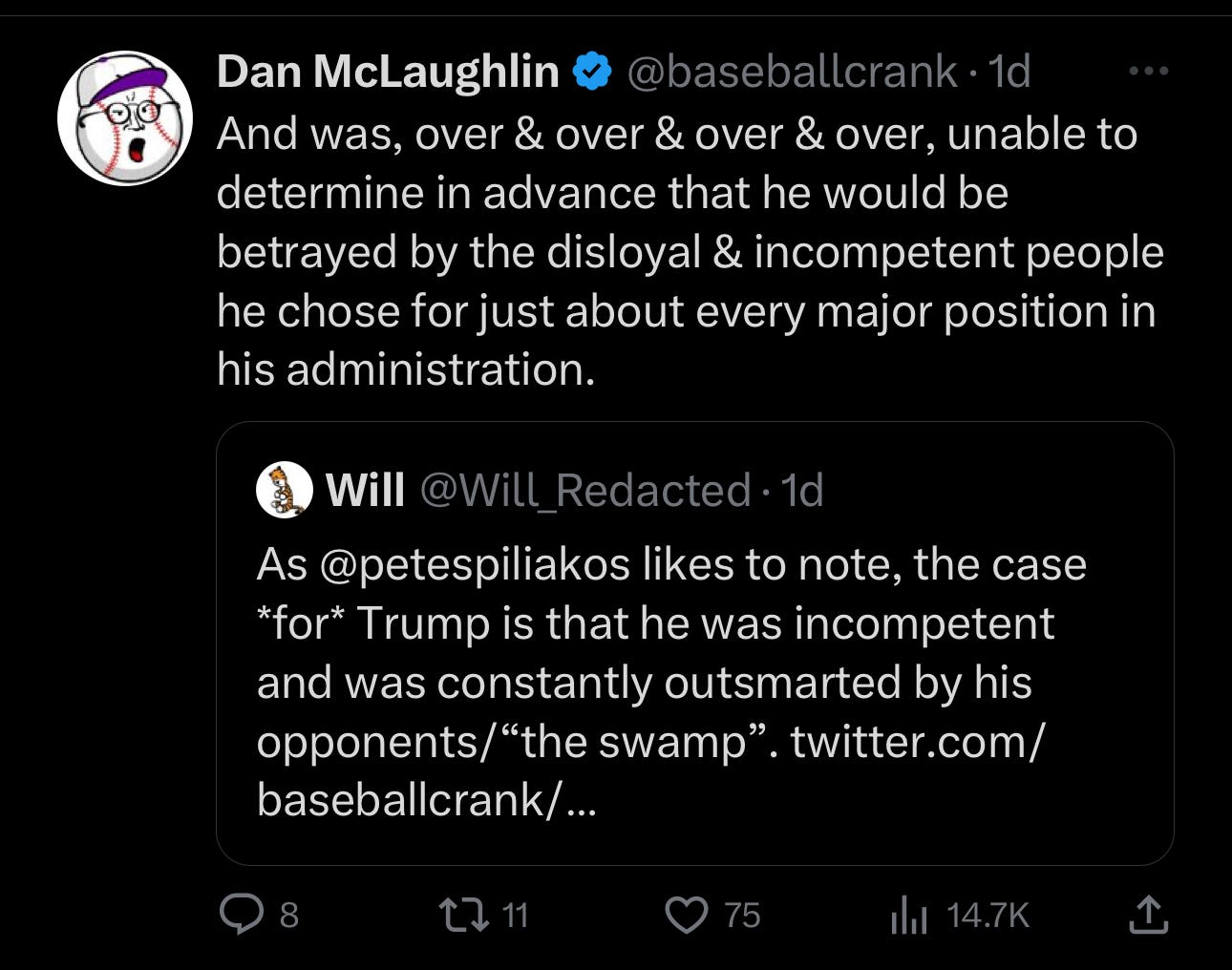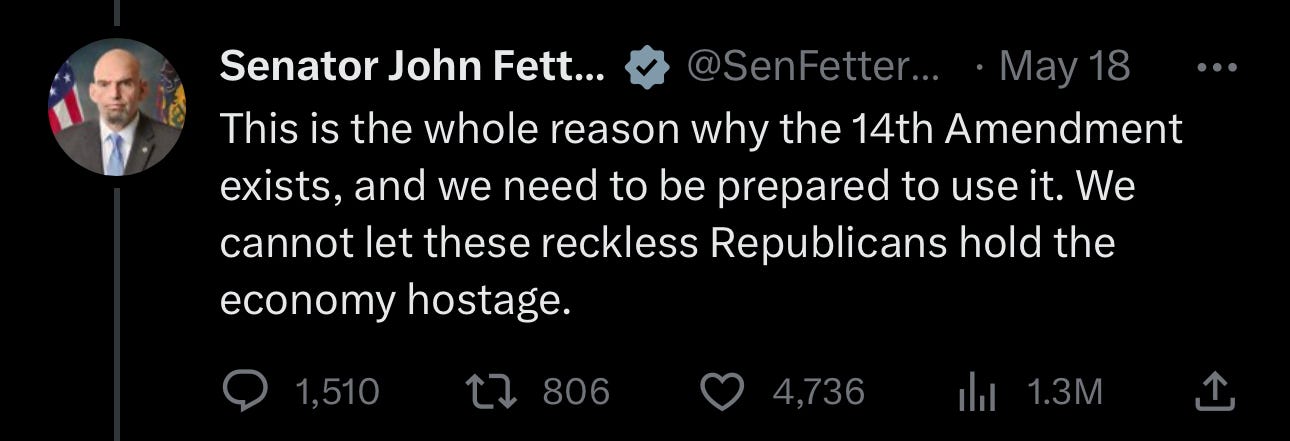When First We Practice to Deceive. . .
MAGA and the National Debt
Well, hello there! What have I missed in the last year and a half?
OK, it’s not about what I’ve missed. Here’s why I’ve been offline.
I became very discouraged about the direction of this country in late 2022, when a bunch of Trumpist knuckleheads were nominated by the GOP for the November 2022 midterm elections. Although I appreciated the fact that most of them lost, and some of them lost very badly (ranging from Doug Mastriano and Mehmet Oz in Pennsylvania to Don Bolduc in New Hampshire to Hershel Walker in Georgia to Kari Lake and Blake Masters in Arizona to Sarah Palin in Alaska), the mere fact that such manifestly ill-equipped bozos were nominated by one of the two major parties in this country — the one that used to be supported by classical liberals like me — was profoundly discouraging.
And then, immediately after that disaster was complete, The Former Guy, aka Captain Coup, aka the Darth Vader of Queens, aka the Maestro of Misinformation himself — Donald John Trump — declared his “victory” in these “successful” midterms despite his candidates being trounced (but that was always someone else’s fault, because nothing is ever Trump’s fault in his self-centered world), and announced his candidacy for the 2024 GOP nomination. Then 2023 featured my 90-year-old mother developing serious circulatory problems early in the year, which led to her move to senior housing and then her death in the autumn at 91.
Now, another eight months later, the last Republican candidate that was standing against Trump and MAGA — Nikki Haley, whom I went to see at a town hall in Milford, NH in January and at a rally in Needham, MA in early March, and to whom I donated — announced that she would vote for Trump in 2024, despite Trump having called her “birdbrain” and insulted both her and her active-duty husband repeatedly. She’s taken heavy criticism from the Never-Trumpers for doing so, but the key point to me is that she would have made a far, far better president than either Trump or Biden. Heck, the first 200 names in the Boston phone book probably contain at least 50 people fitting that description. Then again, if wishes were horses, then beggars would ride.
Haley’s fellow South Carolinian Tim Scott seems to be one of a crowd actively seeking Trump’s VP nod, along with many low-life MAGA bozos such as J.D. Vance from Ohio and Elise Stefanik from NY. Perhaps, to quote Jonah Goldberg, “there are many rooms in the mansion of motivation,” and these VP candidates just want the name recognition.
But to get that name recognition, your candidate has to win, and, again to borrow from Goldberg, if you’re running for president, you need to make a case that you’re the best person running for the job — and that’s something that Trump seems to me to be poor at doing (although he’s a master at spinning rude insults, which seems to be what his MAGA cultists like about him). Right now, it appears that if the election is about Trump, Biden will win; if the election is about Biden, Trump will win. Both candidates seem to understand this, although their followers do not.
I just didn’t feel like writing in an environment where we were still focused on Trump . . . or even Trump and Biden
Depression? Perhaps. But if you don’t draw lines and distinctions, you blur them, and you help destroy the country. The Donald is simply unsuited for a serious role like the Presidency. But selling snake oil: perfect!
I’ve been wallowing in that depression for the last eighteen months, but then I realized that the 30% of Republicans who are hardcore Trump voters mostly aren’t among my readers, which has cheered me up some.
If you believe that Donald Trump should be the 2024 Presidential nominee because he’s being persecuted by the “deep state”, you’re shamefully wrong, but I can’t change your thinking, because it’s too aberrant for me to even understand. The “deep state” may have sided and may be siding against Trump’s campaign, but it didn’t attempt a coup to stop him. On the other hand, like Hugo Chavez in Venezuela, coups appear to be Trump’s thing.
If you believe Trump’s claim that he’s being persecuted because the “deep state” is really after you and he’s in the way, you may charitably be considered an idiot. Uncharitably . . . well, I won’t go there, because one of my (former?) readers said that I often became as insulting as Trump, which I acknowledge is not a compliment.
Oh, and how do you like that wall that Trump built along the southern border, the one that Mexico paid for? Made immigrant crises a thing of the past, didn’t it?
It didn’t? There is no wall? And Mexico didn’t offer to pay for it? SUCKER!
By the way, Trump didn’t have disloyal and incompetent people in his administration. But he did have a handful of people who put their obligations under the Constitution ahead of the personal objectives of The Donald, ranging from Vice President Mike Pence to Attorney General William Barr. And Trump hates them passionately for it; he blames all of his lack of achievements on them. And yet his cult of personality still loves him and wants him to become dictator . . . “just for one day”, he says. They believe things were better under Trump, because we had all of these wonderful things that came along with Trump (like COVID?), and . . . well, because Trump told them so.
Got any more of that snake oil?
Learning to Love the Debt Ceiling
The stupidity of our time isn’t limited to Republicans, although Trump is quite clearly the most prominent offender, because he only speaks the truth by accident. But right now, I’d rather talk about something that both parties are guilty of ignoring: the federal debt ceiling.
Before WWII, the U.S. followed a predictable pattern. It would borrow money in hard times and when there were major expenses (such as a war), and then pay the money back when the crisis passed. But after WWII, basic demographics and a new government program created a huge crisis, and the debt crisis that resulted from those factors has been demagogued by politicians for my entire life. I’m going to try to explain it, but I know people won’t believe it, because they’ve heard something else so often.
During FDR’s largely-incoherent “New Deal”, the federal government set up Social Security.
There were two possible ways to set up Social Security. Under the first approach, Social Security could be structured to create individual accounts for all workers — the money from Social Security taxes would go into an account designated for a specific worker (normally referred to as an “individual account” or a “trust fund”, segregated from the U.S. government’s general revenues); the account would earn interest over time; and the worker would receive payments from that account upon retirement. The problem with this approach is that people in the 1930s who had already retired or were close to retirement would have little or no money in their designated accounts, and those were the people who most needed funds during the Depression. So this approach was scorned by Democrats for being “mean” to the poor, who needed funds right then.
Under the second approach, all money from Social Security taxes would go into the U.S. government’s general fund. There would be accounting entries kept showing how much in Social Security tax was paid by an individual, but no funds would be segregated, and the payments upon retirement would also be made from the government’s general fund based on a formula, not on the amount paid in. As opposed to the “trust fund” system in the first option, this is sometimes referred to as a “pay-as-you-go” system. Its solvency depends entirely on either (1) enough tax money coming in to the U.S. treasury each year to cover the entitlement payments going out that year, or (2) the government doing short-term borrowing to cover the shortfall.
The problem with this second approach is that, if life expectancy increased and we had a “baby bust”, where we had fewer babies being born than we had people retiring, the government’s short-term borrowings might have to become permanent. And then the U.S. would need to have perpetual growth in earnings and the gross domestic product, or it would go bust from the interest payments on that debt.
Despite this, the second approach was selected. The key thing about this choice is that there was — and is, to this day — NO SUCH THING AS A SOCIAL SECURITY TRUST FUND, just a series of accounting entries on paper. Think about this: every time in your life that you have heard some politician refer to the “Social Security Trust Fund”, you have been lied to. EVERY SINGLE TIME!
Once again: there is no “Social Security Trust Fund”. There isn’t even one thin dime set aside to pay future Social Security entitlements. Every penny in taxes that you paid in to Social Security? It was spent to fund government deficits in past years. The amount of money the government has set aside to pay your future Social Security benefits? $0.00. So please don’t ever say that you are entitled to Social Security because it represents your money being paid back to you. It does not. Under the way the system was set up, every penny you paid in was spent the same year you paid it in. And we were still borrowing money, because we kept raising benefits for future retirees.
And, as any sane economist would have predicted (I add “sane” to exclude Paul Krugman), the inherent problem in the second approach came to pass. The post-WWII generation — the “Baby Boom” — turned out to be significantly larger than any other generation. Beginning with the U.S. Surgeon General’s warning label on cigarettes in 1966, cigarette smoking declined dramatically went from being chic and acceptable to being discouraged and lower-class — which was a key part of a significant extension of American lifespan. [Footnote: In fact, back in the mid-1990s, when the states were suing the tobacco companies for medical expenses borne by Medicare and Medicaid that were due by smoking, one of the top U.S. economists with expertise in estimating legal expenses in the U.S. (and one of my professors at Harvard Law when I was there, W. Kip Viscusi) ran a study on such costs (funded solely by the National Bureau of Economic Research, not by the tobacco companies) . . . and found out that cigarette smoking had actually reduced the total expenses borne by government health programs, because, despite all of the expenses (particularly cancer treatment) that cigarette smoking undoubtedly caused, it shortened lifespans by so many years that it produced a net reduction in these costs by eliminating a significant portion of “old-age” health expenses; in response, some of the states that were suing the tobacco companies then passed laws prohibiting the tobacco companies from using data about shorter lifespans in their defense against these lawsuits!] And a few years further down the road, the US (along with the rest of the developed world) had a baby bust. As a result, when the Baby Boom generation finally started to retire during the past decade, the Social Security taxes paid in the the U.S. government have not been sufficient to keep Social Security operating under the “pay-as-you-go” approach.
The Myth of the “Social Security Trust Fund”
During the 1980s, a lot of effort was devoted by Republicans to devising plans to rework Social Security to avoid this inevitable fiscal cliff, which would arrive when the baby boomers reached retirement age. However, these efforts were successfully demagogued by a cabal from the left side of the aisle (i.e., Democrats) led by the debauched Democratic senator from Massachusetts, Edward M. “Ted” Kennedy, who kept harping upon the damage that these plans would do to the nonexistent “Social Security Trust Fund.” (If I had a dollar for every time I heard a politician lie about the “Social Security Trust Fund”, I’d probably be rivaling Elon Musk’s net worth pre-Twitter X.)
As a result, nothing was ever done, and reforming Social Security to avoid these future deficits became known as the “third rail of American politics” (for those of you who don’t live in cities with subways, the third rail is electrified at high voltage to power the subways that run on its tracks; touch it and die).
There are two possibilities underlying Ted’s effort: either (1) even before Trump, Ted knew that you could never go wrong by underestimating the intelligence of the American people — after all, didn’t Abe Lincoln himself admit that “you can fool some of the people all of the time”? — or (2) Ted figured correctly that he wouldn’t be around when the bill for his dissembling came due and the U.S. had to borrow like mad to meet its obligations; he’d just be a dead leftist icon.
Mary Jo Kopechne could not be reached for comment.
But the bill has now come due. About half of the baby boomers (those born 1946-1954) are currently in their 70s and retired; the rest (those born 1955-1962) will be there shortly. The baby bust is actually accelerating. And the Social Security “entitlements” (at least until the federal congressmen lower or even revoke them) force the U.S. government into borrowing every month, because the Social Security tax revenue is far less than the benefits owed to recipients.
Side note 1: The last years when the U.S. didn’t run at an annual deficit were 1998-2001; thank you, Bill Clinton!
Side note 2: One approach to a baby bust is to increase permitted immigration into the U.S.; if the new immigrants pay taxes (instead of consuming resources such as welfare), they’ll offset the shortage of native-born Americans. But it seems impossible for American politicians to have an honest conversation on this topic; instead, they demagogue it the same way that Ted Kennedy demagogued the Social Security “trust fund” discussions. Would anyone expect something different from such featherweights as Joe Biden and Donald Trump (or their enablers and aides)? I’d love to hear Paul Ryan, for example, discussing this, but the Trumpists drove him out of public office back in 2018.
The Current Situation
So that’s how we got here. The U.S. has to borrow — and borrow a lot — to meet its obligations. Entitlements like Social Security and interest payments on our existing debt make up about half of annual federal spending. In addition to those entitlements, Congress has to fund American defense spending, because, as we’re seeing in Ukraine, the only way we can remain free is by being so powerful that no one can conquer us.
For what it’s worth, our contributions to Ukraine are not insignificant, but the weapons are being used against a country (Russia) that, along with its closest ally (China), has vowed to end the U.S.-led world order. Most of us (other than the Trumpists, who seem to love totalitarian leaders, at least in the abstract) don’t want to leave our children in a position where they need to learn Russian or Chinese to speak with their foreign rulers. And then another country allied with those two (Iran) used its proxy armies (principally Hamas, but also Hezbollah) to attack Israel. And — surprise ! — a wave of antisemitism arose from the American progressives, a wave which in overall size among American college-aged students, resembles nothing as much as Nazi Germany in 1933.
And the U.S. currently has a self-proclaimed authoritarian (Trump) and a doddering authoritarian sympathizer (Biden) running to be in charge of U.S. policy over the next four years? I know I’m not alone in my panic over the dangers posed by either candidate, and yet those appear to be our only choices. But back to the federal debt.
As a result of our deficit spending and existing debt, the federal budget arguments that take place in Congress in the shadow of the debt ceiling can only make meaningful changes to the amount referred to as “non-defense discretionary spending” — which makes up less than 40% of the federal budget in total.
Can these negotiations actually make meaningful changes?
Joe Biden looked particularly responsible when (as unfortunately actually happened, just about a year ago) Donald Trump called for the U.S. government to default on the debt due to the chaos it would cause for the Biden administration — despite the fact that a U.S. debt default would hurt basically EVERY American EXCEPT Trump. Keep this in mind at your next MAGA rally.
But anyone who doesn’t understand by now that the only American whom Donald Trump actually cares about is Donald Trump has already consumed a few bottles too many of his snake oil . . . probably too many to regain sanity.
Larry Tribe and the 14th Amendment Gambit
But a fair number of leftists were advocating against this compromise, the same as Donnie from Queens was. Compromise? Some of the Democratic Congresspersons disagree with the whole idea. They might get primaried if they agree to cut leftist priorities.
So how did the leftists propose to prevent a vote? By pretending that Article 4 of the 14th Amendment overrides the budgeting provisions in the Constitution. The bozo behind this proposal was the once-respected legal “scholar” Lawrence “Larry” Tribe of Harvard, an octogenarian who would probably have been Jimmy Carter’s first choice for a Supreme Court justice back in the 1970s had Jimmy Carter gotten a pick (but, thank heavens, Carter didn’t).
This is a scam argument, similar in nature to Trump’s 2020 argument that the Vice President could nullify state election results. But instead of just insulting it, let’s look at it seriously.
The Constitutional Provisions
Article I, Section 8 of the Constitution provides that “The Congress shall have Power” to “pay the Debts . . . of the United States” and to “borrow Money on the credit of the United States”. And Congress is the only body given this power. Done deal, right?
Not to dishonest leftists. Around seventy years later, the Civil War started. To fight the Civil War, both the Union and the Confederacy borrowed money — lots of it. The Union won, and the winners get to make the rules, including with regard to war debts. To make clear that the Union debts would be repaid but the Confederate debts would not be, the 14th Amendment to the Constitution included the following provision near the end:
Section 4. The validity of the public debt of the United States, authorized by law, including debts incurred for payment of pensions and bounties for services in suppressing insurrection or rebellion, shall not be questioned. But neither the United States nor any State shall assume or pay any debt or obligation incurred in aid of insurrection or rebellion against the United States, or any claim for the loss or emancipation of any slave; but all such debts, obligations and claims shall be held illegal and void.
As Tribe suggests, the language of that clause is unequivocal. But that clause only says that the debt is valid. Every day, people default on perfectly-valid debt. That’s why we have a bankruptcy regime in the United States. Nothing in that clause authorizes the United States to borrow money and issue new debt to pay off the old debt.
No one except for a brain-addled partisan would take this argument seriously. Unfortunately, in 2023 there were plenty of brain-addled partisans out there, including the junior senator from Pennsylvania, who has shown himself to be more sensible since then:
Senator Fetterman’s claim that a legal argument that was never raised for about 150 years was “the whole reason” that the piece of legislation exists? . . . well, let’s just say that there isn’t any legal argument that can’t be corrupted by bad actors, and at the time, Fetterman was choosing to follow one.
Of course, as we already discussed, Professor Emeritus Tribe is in his 80s, so perhaps he too isn’t as sharp as he once was. Hey, do you know who else is in his 80s and running for re-election to the most difficult job in the world? And do you know who is running against him and would be in his 80s less than halfway through his term, if he were to win? Demographics and politics don’t have much use for octogenarians.
By contrast, the U.S. Supreme Court has four justices in their 50s, three in their 60s, and only two in their 70s; the oldest, 75-year-old Clarence Thomas, is still younger than both of the 2024 presidential candidates.
But we’ve come to a sad point: the presence of a pathological liar and a habitual liar as the major party nominees in the 2024 presidential race has caused voters to minimize the importance of character in a presidential candidate — or in a president.
And that’s what has made it hard to write about politics for a while. But I’ll be back on at least a weekly basis beginning as of now.
Hopefully.
* * *
This meme was added for Barry Paul, as a humorous response to his claim in the comments that President Biden “will always put the country above self-interest.”
By the way, there is a footer at the end of this post that is now standard, unless I specifically delete it. I’ve left it there for now, but I need to get back into the routine of making these posts on a regular basis before anyone really needs to think about it.






Calling President Biden a “ doddering authoritarian sympathizer” in comparison to the self-proclaimed authoritarian Trump is an insidious false equivalency. Trump is maniacally self-interested and self-serving in his desire to be king for life. Despite whatever flaws you would like to ascribe to President Biden, he will always put the country above self-interest and at least has a moral compass. Trump doesn’t even know what one is.